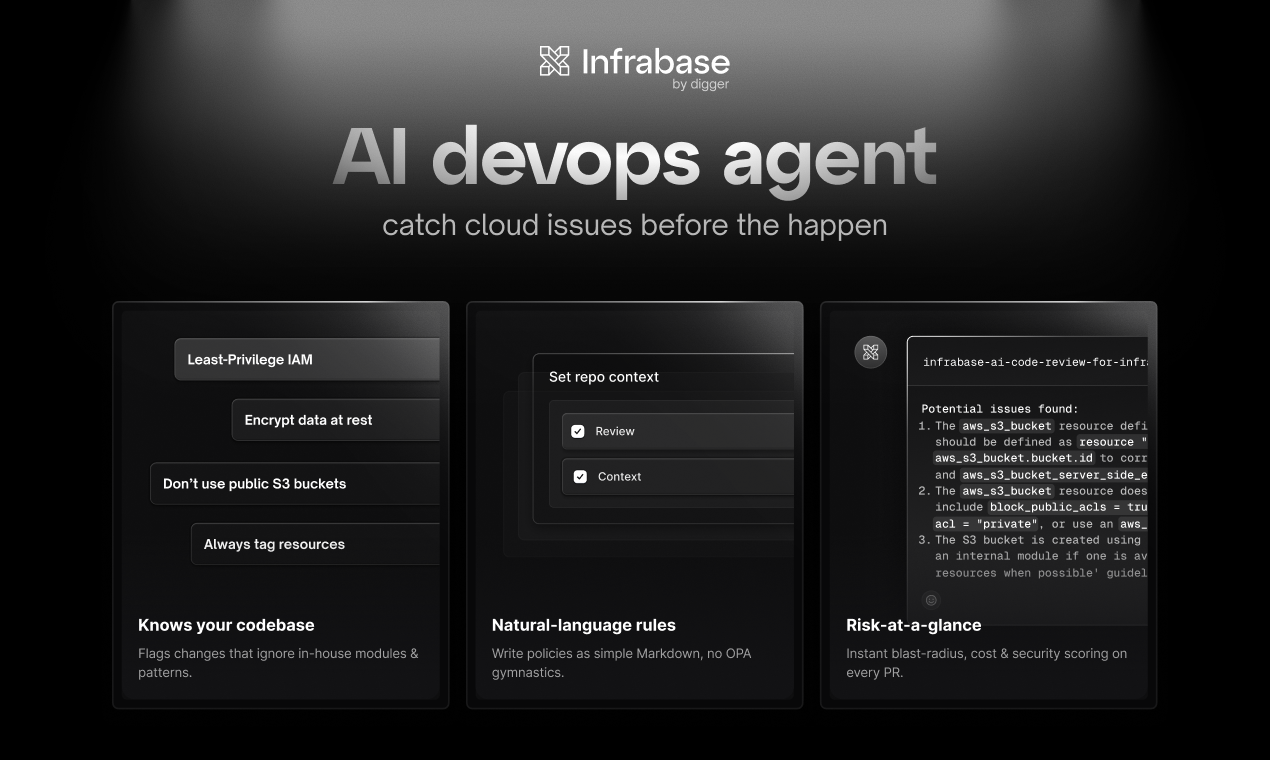
Table of Contents
Overview
In today’s rapidly evolving cloud infrastructure landscape, managing security vulnerabilities, cost overruns, and compliance violations presents significant operational challenges. Infrabase emerges as an AI-powered platform that proactively scans code repositories and organizational contexts to identify potential security gaps, cost anomalies, and policy violations before they impact live cloud environments. This approach enables development teams to build secure and efficient systems from the ground up, preventing issues rather than reacting to them post-deployment.
Key Capabilities
Infrabase delivers a comprehensive suite of features designed to streamline cloud governance:
- Organizational Context Intelligence: The platform analyzes your specific codebase patterns, internal modules, and organizational conventions to flag deviations from established practices during code reviews.
- Natural Language Policy Configuration: Teams can define complex cloud policies using intuitive markdown format, eliminating the need for specialized Open Policy Agent (OPA) Rego language expertise.
- Real-time Risk Assessment: Each pull request receives immediate blast radius analysis, cost projections, and security scoring to provide clear visibility into potential impacts.
- Pre-deployment Security Scanning: The system identifies vulnerabilities, misconfigurations, and compliance violations before code reaches production environments.
- Cost Anomaly Detection: Automated identification of unusual spending patterns helps organizations maintain budget control and optimize cloud resource utilization.
Technical Implementation
Understanding Infrabase’s operational methodology reveals its preventative approach to cloud management.
The platform functions as a GitHub application that integrates directly into development workflows. It securely indexes infrastructure code and organizational metadata to build comprehensive contextual understanding without storing raw source code. When developers create pull requests, Infrabase performs automated analysis using a combination of Gemini 2.5 Pro and OpenAI GPT-4 models to evaluate code changes against both generic best practices and organization-specific patterns.
The implementation process involves:
- Installing the Infrabase GitHub app and selecting target repositories for monitoring
- The platform learns from existing infrastructure patterns and organizational conventions
- Pull request analysis provides actionable feedback on security issues, cost implications, and policy violations through automated comments
Practical Applications
Infrabase addresses critical cloud management challenges across multiple domains:
- DevSecOps Integration: Seamless incorporation into existing development workflows with early-stage feedback on potential security and compliance issues.
- Infrastructure Cost Optimization: Automated detection of configuration changes that could lead to unexpected cloud spending increases.
- Compliance Automation: Continuous enforcement of organizational policies without requiring manual oversight or specialized security expertise.
- Risk-based Development: Pre-deployment assessment enables informed decision-making about infrastructure changes and their potential business impact.
- Team Productivity Enhancement: Natural language policy creation democratizes governance participation beyond specialized DevOps teams.
Advantages and Limitations
Benefits
- Shift-left Security: Issues are identified and resolved during development phases rather than after deployment, significantly reducing remediation costs and security exposure.
- Accessible Policy Management: Natural language policy definition removes technical barriers for non-experts while maintaining sophisticated governance capabilities.
- Contextual Awareness: Understanding of organization-specific patterns and conventions provides more relevant and actionable insights compared to generic scanning tools.
- Comprehensive Impact Analysis: Real-time assessment of changes provides clear visibility into blast radius, cost implications, and security ramifications.
Current Constraints
- Integration Requirements: Effective utilization requires substantial access to development repositories and organizational context, necessitating careful initial configuration.
- Early-stage Technology: As acknowledged by the development team, the platform experiences non-determinism and latency challenges inherent in LLM-based approaches.
- Enterprise Readiness: Current limitations make it less suitable for large-scale enterprises requiring deterministic policy enforcement, though this may improve as the technology matures.
Market Position and Competitive Analysis
Within the cloud security and governance landscape, Infrabase occupies a distinct position focused on pre-deployment policy enforcement through natural language interfaces.
Established platforms like Wiz excel in comprehensive vulnerability management and threat detection across cloud environments, while Lacework specializes in behavioral analytics and runtime security monitoring. These solutions primarily address post-deployment security challenges.
Infrabase differentiates itself by emphasizing prevention over detection, enabling organizations to define and enforce policies using accessible natural language before issues reach production environments. However, it’s important to note that the platform currently serves smaller organizations and teams beginning their policy automation journey rather than enterprises requiring strict deterministic enforcement.
Pricing and Accessibility
Infrabase offers a freemium model with the first 10 reviews provided at no cost, followed by a monthly subscription of \$99. This pricing structure allows organizations to evaluate the platform’s effectiveness before committing to ongoing investment.
Expert Assessment and Future Outlook
Industry Recognition: According to available documentation, Infrabase is built by Digger and used by cloud-native organizations, though specific customer testimonials and case studies are limited in publicly available sources.
Technology Foundation: The platform leverages cutting-edge large language model technology, specifically Gemini 2.5 Pro and GPT-4 models, to provide contextual analysis that traditional rule-based systems cannot match.
Development Trajectory: The development team acknowledges current limitations while emphasizing that “some guard-rails today beats perfect rego never” for organizations lacking existing policy frameworks. As LLM technology continues advancing, Infrabase’s capabilities are expected to improve correspondingly.
Conclusion
Infrabase represents an innovative approach to cloud governance that addresses the accessibility and implementation challenges that have historically limited policy-as-code adoption. By combining AI-powered analysis with natural language policy definition, the platform makes sophisticated cloud governance accessible to broader development teams.
Best Fit Organizations: Small to medium-sized teams currently operating without comprehensive cloud policies who need an accessible entry point into infrastructure governance.
Strategic Value: The shift-left approach to security and compliance provides significant value by preventing issues rather than detecting them post-deployment, potentially saving substantial remediation costs and security incidents.
Future Considerations: While current limitations make it less suitable for large enterprises requiring strict deterministic policies, the platform’s trajectory suggests increasing sophistication as underlying AI technologies mature.

